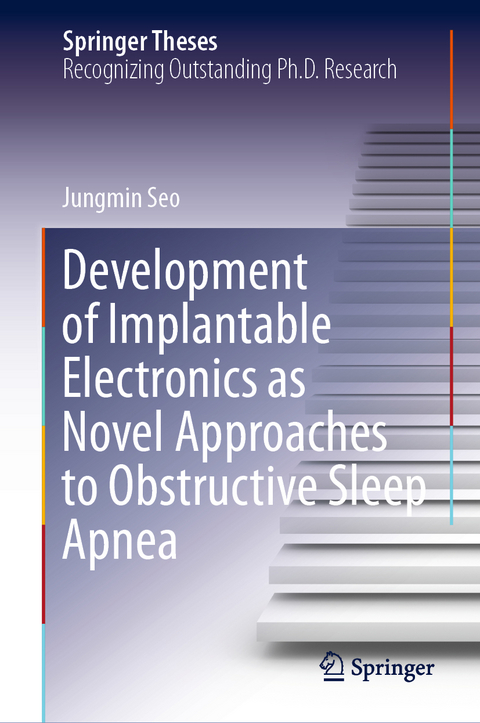
Development of Implantable Electronics as Novel Approaches to Obstructive Sleep Apnea
Seiten
2020
|
1st ed. 2021
Springer Verlag, Singapore
978-981-15-8326-1 (ISBN)
Springer Verlag, Singapore
978-981-15-8326-1 (ISBN)
Implantable electronics are devised to control the tongue and the soft palate considering that they are the major pharyngeal muscles contributing to the apnea. For soft palate control, a palatal implant system was firstly developed to contract the soft palate muscle by applying electrical stimuli.
This book addresses novel methods to treat a very popular disease, obstructive sleep apnea, based on a knowledge of an electrical engineering. Two approaches are given in the book using an upper-airway stimulation based on the pathogenesis of an obstructive sleep apnea. Implantable electronics are devised to control the tongue and the soft palate considering that they are the major pharyngeal muscles contributing to the apnea. First, for tongue control, a cuff electrode was designed and fabricated to stimulate the hypoglossal nerve, which innervates to the tongue muscle. Rare-earth magnets were embedded in the cuff for easy and repeatable installation of the electrode. For soft palate control, a palatal implant system was firstly developed to contract the soft palate muscle by applying electrical stimuli. Comprised of an implant, an intra-oral device, and an external controller, the palatal implant system is fully powered and controlled by means of wireless communication. The approaches were demonstrated in both in vitro and in vivo assessments, in collaboration with department of Otorhinolaryngology, Seoul National University Bundang Hospital.
This book addresses novel methods to treat a very popular disease, obstructive sleep apnea, based on a knowledge of an electrical engineering. Two approaches are given in the book using an upper-airway stimulation based on the pathogenesis of an obstructive sleep apnea. Implantable electronics are devised to control the tongue and the soft palate considering that they are the major pharyngeal muscles contributing to the apnea. First, for tongue control, a cuff electrode was designed and fabricated to stimulate the hypoglossal nerve, which innervates to the tongue muscle. Rare-earth magnets were embedded in the cuff for easy and repeatable installation of the electrode. For soft palate control, a palatal implant system was firstly developed to contract the soft palate muscle by applying electrical stimuli. Comprised of an implant, an intra-oral device, and an external controller, the palatal implant system is fully powered and controlled by means of wireless communication. The approaches were demonstrated in both in vitro and in vivo assessments, in collaboration with department of Otorhinolaryngology, Seoul National University Bundang Hospital.
Dr. Jungmin Seo is an researcher at Samsung Electronics. He received his PhD from the Seoul National Univerisity in 2019.
Introduction.- Methods.- Results.- Discussions.- Conclusion.
| Erscheinungsdatum | 16.10.2020 |
|---|---|
| Reihe/Serie | Springer Theses |
| Zusatzinfo | 34 Illustrations, color; 12 Illustrations, black and white; XVII, 75 p. 46 illus., 34 illus. in color. |
| Verlagsort | Singapore |
| Sprache | englisch |
| Maße | 155 x 235 mm |
| Themenwelt | Medizin / Pharmazie ► Physiotherapie / Ergotherapie ► Orthopädie |
| Technik ► Elektrotechnik / Energietechnik | |
| Technik ► Medizintechnik | |
| Schlagworte | Cuff-to-Nerve Diameter Ratio • Electrochemical Measurements • External Pulse Generator • Hypoglossal Nerve Stimulation • Liquid Crystal Polymer • Magnet-Embedded Nerve Cuff Electrode • Magnetic Cuff System • Obstructive Sleep Apnea • Palatal Implant System • Soft Palate Stimulation • Wireless power transmission |
| ISBN-10 | 981-15-8326-9 / 9811583269 |
| ISBN-13 | 978-981-15-8326-1 / 9789811583261 |
| Zustand | Neuware |
| Informationen gemäß Produktsicherheitsverordnung (GPSR) | |
| Haben Sie eine Frage zum Produkt? |
Mehr entdecken
aus dem Bereich
aus dem Bereich
Kommentar zu DIN EN ISO 14155
Buch | Softcover (2024)
Beuth (Verlag)
CHF 102,20


